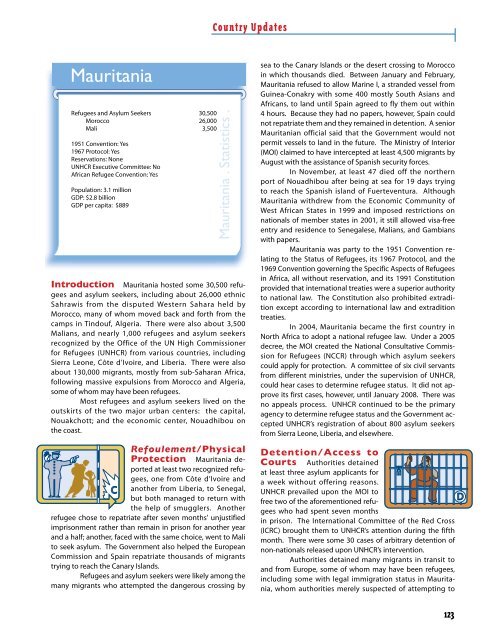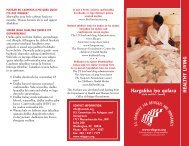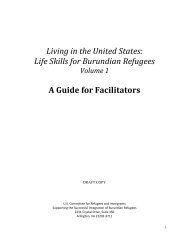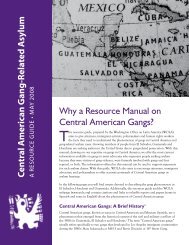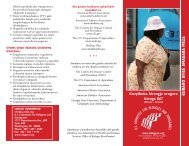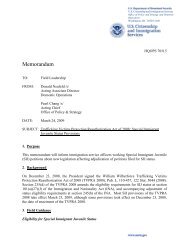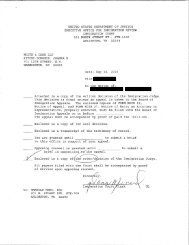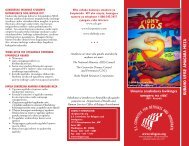Refugees and Asylum Seekers
Refugees and Asylum Seekers
Refugees and Asylum Seekers
Create successful ePaper yourself
Turn your PDF publications into a flip-book with our unique Google optimized e-Paper software.
Mauritania<br />
<strong>Refugees</strong> <strong>and</strong> <strong>Asylum</strong> <strong>Seekers</strong> 30,500<br />
Morocco 26,000<br />
Mali 3,500<br />
1951 Convention: Yes<br />
1967 Protocol: Yes<br />
Reservations: None<br />
UNHCR Executive Committee: No<br />
African Refugee Convention: Yes<br />
Population: 3.1 million<br />
GDP: $2.8 billion<br />
GDP per capita: $889<br />
Introduction Mauritania hosted some 30,500 refugees<br />
<strong>and</strong> asylum seekers, including about 26,000 ethnic<br />
Sahrawis from the disputed Western Sahara held by<br />
Morocco, many of whom moved back <strong>and</strong> forth from the<br />
camps in Tindouf, Algeria. There were also about 3,500<br />
Malians, <strong>and</strong> nearly 1,000 refugees <strong>and</strong> asylum seekers<br />
recognized by the Office of the UN High Commissioner<br />
for <strong>Refugees</strong> (UNHCR) from various countries, including<br />
Sierra Leone, Côte d’Ivoire, <strong>and</strong> Liberia. There were also<br />
about 130,000 migrants, mostly from sub-Saharan Africa,<br />
following massive expulsions from Morocco <strong>and</strong> Algeria,<br />
some of whom may have been refugees.<br />
Most refugees <strong>and</strong> asylum seekers lived on the<br />
outskirts of the two major urban centers: the capital,<br />
Nouakchott; <strong>and</strong> the economic center, Nouadhibou on<br />
the coast.<br />
C<br />
Mauritania . Statistics .<br />
Refoulement/Physical<br />
Protection Mauritania deported<br />
at least two recognized refugees,<br />
one from Côte d’Ivoire <strong>and</strong><br />
another from Liberia, to Senegal,<br />
but both managed to return with<br />
the help of smugglers. Another<br />
refugee chose to repatriate after seven months' unjustified<br />
imprisonment rather than remain in prison for another year<br />
<strong>and</strong> a half; another, faced with the same choice, went to Mali<br />
to seek asylum. The Government also helped the European<br />
Commission <strong>and</strong> Spain repatriate thous<strong>and</strong>s of migrants<br />
trying to reach the Canary Isl<strong>and</strong>s.<br />
<strong>Refugees</strong> <strong>and</strong> asylum seekers were likely among the<br />
many migrants who attempted the dangerous crossing by<br />
sea to the Canary Isl<strong>and</strong>s or the desert crossing to Morocco<br />
in which thous<strong>and</strong>s died. Between January <strong>and</strong> February,<br />
Mauritania refused to allow Marine I, a str<strong>and</strong>ed vessel from<br />
Guinea-Conakry with some 400 mostly South Asians <strong>and</strong><br />
Africans, to l<strong>and</strong> until Spain agreed to fly them out within<br />
4 hours. Because they had no papers, however, Spain could<br />
not repatriate them <strong>and</strong> they remained in detention. A senior<br />
Mauritanian official said that the Government would not<br />
permit vessels to l<strong>and</strong> in the future. The Ministry of Interior<br />
(MOI) claimed to have intercepted at least 4,500 migrants by<br />
August with the assistance of Spanish security forces.<br />
In November, at least 47 died off the northern<br />
port of Nouadhibou after being at sea for 19 days trying<br />
to reach the Spanish isl<strong>and</strong> of Fuerteventura. Although<br />
Mauritania withdrew from the Economic Community of<br />
West African States in 1999 <strong>and</strong> imposed restrictions on<br />
nationals of member states in 2001, it still allowed visa-free<br />
entry <strong>and</strong> residence to Senegalese, Malians, <strong>and</strong> Gambians<br />
with papers.<br />
Mauritania was party to the 1951 Convention relating<br />
to the Status of <strong>Refugees</strong>, its 1967 Protocol, <strong>and</strong> the<br />
1969 Convention governing the Specific Aspects of <strong>Refugees</strong><br />
in Africa, all without reservation, <strong>and</strong> its 1991 Constitution<br />
provided that international treaties were a superior authority<br />
to national law. The Constitution also prohibited extradition<br />
except according to international law <strong>and</strong> extradition<br />
treaties.<br />
In 2004, Mauritania became the first country in<br />
North Africa to adopt a national refugee law. Under a 2005<br />
decree, the MOI created the National Consultative Commission<br />
for <strong>Refugees</strong> (NCCR) through which asylum seekers<br />
could apply for protection. A committee of six civil servants<br />
from different ministries, under the supervision of UNHCR,<br />
could hear cases to determine refugee status. It did not approve<br />
its first cases, however, until January 2008. There was<br />
no appeals process. UNHCR continued to be the primary<br />
agency to determine refugee status <strong>and</strong> the Government accepted<br />
UNHCR’s registration of about 800 asylum seekers<br />
from Sierra Leone, Liberia, <strong>and</strong> elsewhere.<br />
Detention/Access to<br />
Courts Authorities detained<br />
at least three asylum applicants for<br />
a week without offering reasons.<br />
UNHCR prevailed upon the MOI to<br />
D<br />
free two of the aforementioned refugees<br />
who had spent seven months<br />
in prison. The International Committee of the Red Cross<br />
(ICRC) brought them to UNHCR’s attention during the fifth<br />
month. There were some 30 cases of arbitrary detention of<br />
non-nationals released upon UNHCR’s intervention.<br />
Authorities detained many migrants in transit to<br />
<strong>and</strong> from Europe, some of whom may have been refugees,<br />
including some with legal immigration status in Mauritania,<br />
whom authorities merely suspected of attempting to<br />
123


